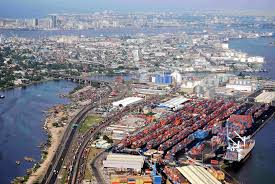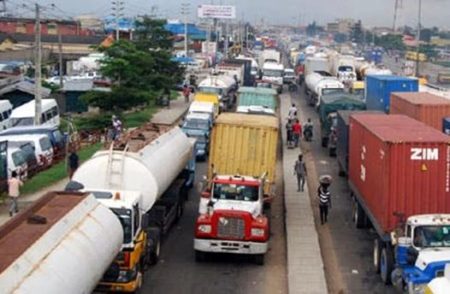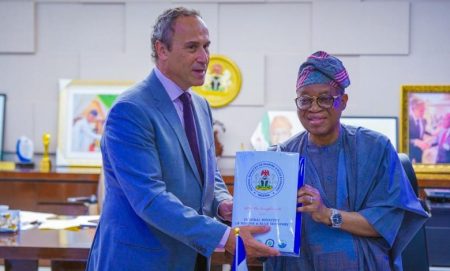
– As agents embark partially suspend strike,
– Customs calls for a stakeholders meeting
Vincent Toritseju
Lagos — The newly introduced Vehicle Identification Number, VIN, by the Nigeria Customs Service, NCS, is currently tearing the Nigerian maritime apart as importers and licensed Customs agents vehemently opposed the policy and began an indefinite protest to press for cancellation of the policy.
The protesting freight forwarders partially suspended the protest to await the outcome of the scheduled meeting with the management of the Nigeria Customs Service which was held yesterday at its training College in Lagos.
Meanwhile, the weeklong protest embarked upon grounded port activities in Lagos as the Customs management tried to make the freight forwarders see reasons for the introduction of the new import policy.
The Customs Service has appealed to the public to embrace the new vehicle identity number, VIN, valuation system it recently introduced for assessing the duty payable on imported vehicles.
The appeal came two days into a strike embarked upon by licensed customs agents at the Tin Can Island Port Complex, Lagos, to protest the new policy.
Members of the Association of Licensed Customs Agents, ANLCA, on Tuesday said they would not back down from their protests over the controversial policy, which they said has increased the cost of clearing an imported vehicle through the port.
“Today, Tuesday, is our second day of protest and we will continue the protest until the NCS authorities tell us what we want to hear from them. We are not saying that the policy is bad, but the implementation is our problem.
“A vehicle duty that we pay N200,000 before, we now pay one million naira because of the policy, that is not right, they should go back to the status quo,” chairman of ANLCA task force, Rilwan Amuni, said.
However, Customs spokesman, Timi Bomodi, said the VIN valuation policy was an innovation designed to harmonize and make the system transparent, urging agents and importers to embrace it.
In a statement, Bomodi said the new system uses “artificial intelligence” to pull together trade data representing a range of values consistent for each car make and model using the vehicle identification number.
“It is totally devoid of human inputs by NCS officers and enables easy and fast assessments necessary to process duty payments.
“Indeed, time-motion studies confirm a maximum of six hours between automated assessments and release of cars using VIN valuation,” he said.
The Customs spokesman said importers that have valid tax identity numbers can do self-assessment and pay duty by themselves.
“Following the demands of agents for a simplified system which recognizes standard values, NCS is confident that this innovation in clearing process will satisfy the desires of agents clamouring for change.
“The resistance to VIN valuation comes as a surprise seeing that it is deliberately designed to meet their demands. It also compels us to investigate further, the intentions of those protesting its use.
“When our valuation officers gave out ex-factory prices for duty assessment, they were accused of collecting monetary inducements to give lower values. It will be interesting to know what these same agents/importers will accuse the machines of discrimination based on non-digital considerations,” Bomodi said.
He said that most of the individuals protesting the introduction of VIN valuation do not care about automation, simplification, harmonization or even transparency in the system.
Bomodi said that all they cared about were the personal benefits accruable from milking the system.
Appealing to the protesting agents, the Chairman of the Nigerian Port Consultative Council, NPCC, Otunba Kunle Folarin said that shutting down the ports will not make anybody any good as both the economy and the trading public will suffer the consequences of the protest.
Meanwhile, the Customs yesterday called for a meeting with stakeholders in the maritime industry.
Speaking in support of freight forwarders calling off the protest, the Deputy National President, National Association of Government Approved Freight Forwarders, NAGAFF, Segun Musa, said that policy said scarce resources that should be used to provide social amenities will be diverted to purchasing arms and ammunition saying, the policy will fuel smuggling.
He, however, charge the government to fine-tune the policy saying if not, it will lead to high smuggling of vehicles as importers will prefer neighbouring ports to Nigerian seaports due to high duty payment.
“The implication is if we fail to address this, not only will there be job loss, but smuggling will increase because it’s a way of encouraging legitimate importers to go back to smuggling,”
“We appeal to Customs to have a human face in their dealings. The world is advancing, and we should with it because no one will wait for us. The world has gone beyond Customs officers doing manual operations but rather, online Customs. We as clearing agents should input, pay our duty and get a code that will be used to exit the cargoes from the port without any hassles.
“We want a seamless operation. There should be synergy between private sector and government.”
He said that rather than encourage trade facilitation, the new policy would rather encourage smuggling in of vehicles by importers who want to run away from paying the new ‘outrageous duties’ imposed on imported cars to the government through Customs.
“This will push importers away, companies will shut down while jobs would be a loss, and the government will be using limited resources to buy guns to fight smugglers.” Segun Musa said.
The Executive secretary, Nigerian Shippers Council (NSC), Hon. Emmanuel Jime had also intervened in the impasse between clearing agents and Customs over the VIN valuation at the Tin-Can Island Port Complex, Apapa.
Follow us on twitter



